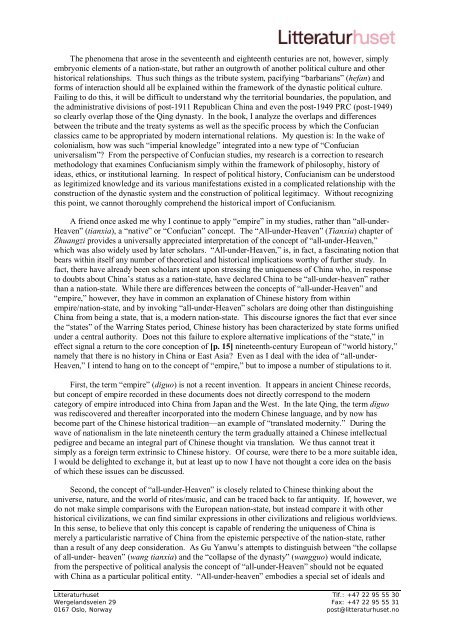20 2011 Opening speech by Prof. Wang Hui ... - Litteraturhuset
20 2011 Opening speech by Prof. Wang Hui ... - Litteraturhuset
20 2011 Opening speech by Prof. Wang Hui ... - Litteraturhuset
You also want an ePaper? Increase the reach of your titles
YUMPU automatically turns print PDFs into web optimized ePapers that Google loves.
The phenomena that arose in the seventeenth and eighteenth centuries are not, however, simplyembryonic elements of a nation-state, but rather an outgrowth of another political culture and otherhistorical relationships. Thus such things as the tribute system, pacifying “barbarians” (hefan) andforms of interaction should all be explained within the framework of the dynastic political culture.Failing to do this, it will be difficult to understand why the territorial boundaries, the population, andthe administrative divisions of post-1911 Republican China and even the post-1949 PRC (post-1949)so clearly overlap those of the Qing dynasty. In the book, I analyze the overlaps and differencesbetween the tribute and the treaty systems as well as the specific process <strong>by</strong> which the Confucianclassics came to be appropriated <strong>by</strong> modern international relations. My question is: In the wake ofcolonialism, how was such “imperial knowledge” integrated into a new type of “Confucianuniversalism”? From the perspective of Confucian studies, my research is a correction to researchmethodology that examines Confucianism simply within the framework of philosophy, history ofideas, ethics, or institutional learning. In respect of political history, Confucianism can be understoodas legitimized knowledge and its various manifestations existed in a complicated relationship with theconstruction of the dynastic system and the construction of political legitimacy. Without recognizingthis point, we cannot thoroughly comprehend the historical import of Confucianism.A friend once asked me why I continue to apply “empire” in my studies, rather than “all-under-Heaven” (tianxia), a “native” or “Confucian” concept. The “All-under-Heaven” (Tianxia) chapter ofZhuangzi provides a universally appreciated interpretation of the concept of “all-under-Heaven,”which was also widely used <strong>by</strong> later scholars. “All-under-Heaven,” is, in fact, a fascinating notion thatbears within itself any number of theoretical and historical implications worthy of further study. Infact, there have already been scholars intent upon stressing the uniqueness of China who, in responseto doubts about China’s status as a nation-state, have declared China to be “all-under-heaven” ratherthan a nation-state. While there are differences between the concepts of “all-under-Heaven” and“empire,” however, they have in common an explanation of Chinese history from withinempire/nation-state, and <strong>by</strong> invoking “all-under-Heaven” scholars are doing other than distinguishingChina from being a state, that is, a modern nation-state. This discourse ignores the fact that ever sincethe “states” of the Warring States period, Chinese history has been characterized <strong>by</strong> state forms unifiedunder a central authority. Does not this failure to explore alternative implications of the “state,” ineffect signal a return to the core conception of [p. 15] nineteenth-century European of “world history,”namely that there is no history in China or East Asia? Even as I deal with the idea of “all-under-Heaven,” I intend to hang on to the concept of “empire,” but to impose a number of stipulations to it.First, the term “empire” (diguo) is not a recent invention. It appears in ancient Chinese records,but concept of empire recorded in these documents does not directly correspond to the moderncategory of empire introduced into China from Japan and the West. In the late Qing, the term diguowas rediscovered and thereafter incorporated into the modern Chinese language, and <strong>by</strong> now hasbecome part of the Chinese historical tradition—an example of “translated modernity.” During thewave of nationalism in the late nineteenth century the term gradually attained a Chinese intellectualpedigree and became an integral part of Chinese thought via translation. We thus cannot treat itsimply as a foreign term extrinsic to Chinese history. Of course, were there to be a more suitable idea,I would be delighted to exchange it, but at least up to now I have not thought a core idea on the basisof which these issues can be discussed.Second, the concept of “all-under-Heaven” is closely related to Chinese thinking about theuniverse, nature, and the world of rites/music, and can be traced back to far antiquity. If, however, wedo not make simple comparisons with the European nation-state, but instead compare it with otherhistorical civilizations, we can find similar expressions in other civilizations and religious worldviews.In this sense, to believe that only this concept is capable of rendering the uniqueness of China ismerely a particularistic narrative of China from the epistemic perspective of the nation-state, ratherthan a result of any deep consideration. As Gu Yanwu’s attempts to distinguish between “the collapseof all-under- heaven” (wang tianxia) and the “collapse of the dynasty” (wangguo) would indicate,from the perspective of political analysis the concept of “all-under-Heaven” should not be equatedwith China as a particular political entity. “All-under-heaven” embodies a special set of ideals and<strong>Litteraturhuset</strong> Tlf.: +47 22 95 55 30Wergelandsveien 29 Fax: +47 22 95 55 310167 Oslo, Norway post@litteraturhuset.no



